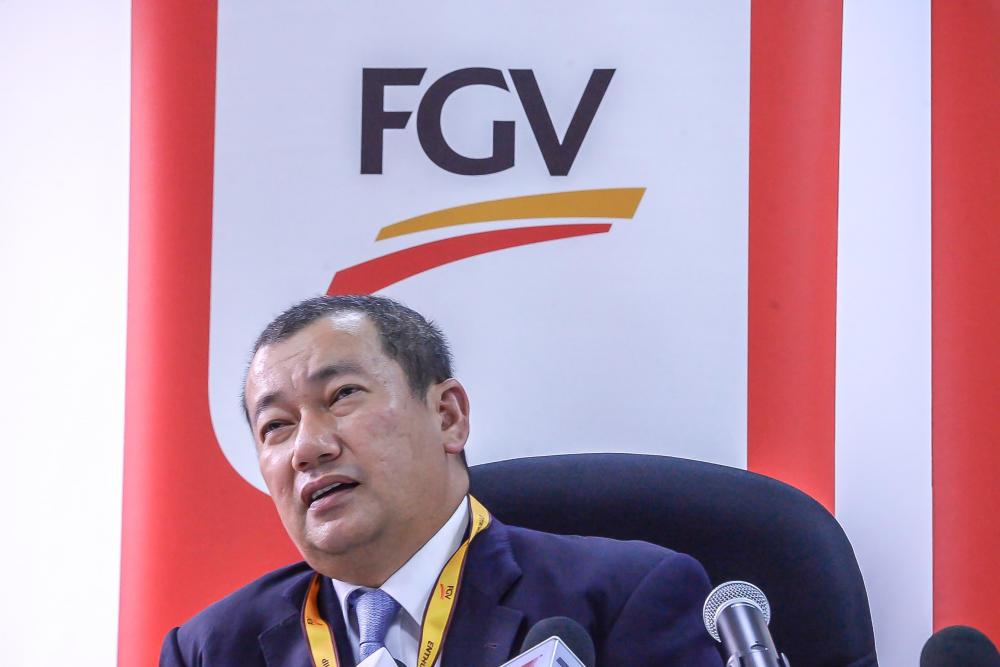PETALING JAYA: Despite not recording a profit in its first quarter, FGV Holdings Bhd’s bottomline numbers indicate operational improvements and the group is on track to achieve its operational targets, said chairman Datuk Azhar Abdul Hamid (pix).
In a letter to shareholders, Azhar said that it is on track to achieve the targets that were set at the beginning of the year namely, fresh fruit bunches (FFB) production of 4.79 million MT, FFB yield of 19.43 MT per hectare (ha), crude palm oil (CPO) cost (ex-mill) of RM1,469 per MT and procurement savings of RM150 million.
As at May 2019, it has achieved FFB production of 1.82 million MT, FFB yield of 6.35 MT per ha, CPO cost (ex-mill) of RM1,482 per MT and procurement savings of RM60.7 million, which is 40.5% of the targeted savings.
“We are also working to reduce the funding for long term capital expenditure using short term financing. This will result in more effective capital management. We have also put greater emphasis on improving FGV’s working capital through better collection of trade debts, tighter credit terms and reducing inventory turnover days,” said Azhar, adding that FGV is on track with its commitment to replant 15,000ha of its palm trees every year.
In terms of legacy issues, Azhar said it is taking commercial and legal steps to address these issues including ongoing legal actions and forensic investigations into several acquisitions and investments.
“Forensic investigations into several other investments are still ongoing, due to the expanded scope of investigations,” he added.
According to him, FGV’s new leadership has also been addressing its procurement spend and a key performance indicator for the entire organisation is now centred around cost management with a focus on managing budgets and improving procurement processes.
FGV took an accelerated cost management approach in the past months to generate more savings, specifically in initiatives to aggregate volume and in the negotiation of supplier contracts, which will contribute to the company’s long term profitability and sustainability.
“A total of 42 key procurement initiatives have been registered and tracked in Q1 2019. To date, the programme has registered 97.6% completion rate with estimated savings of nearly RM32.7 million for the quarter, of which 18.4% is in capital expenditure (capex) savings and 14.7% in operational expenditure savings against the budget.
“One of the key initiatives was our spend on fertilisers where we recorded a cost savings of 17.9%, resulting from rationalisation efforts and price negotiations. Structural changes to centralise and consolidate procurement functions across the company have also contributed to increased process efficiencies and speed to market,” said Azhar.
On the disposal of non-core assets, he said the review of the potential disposals are ongoing and the board has already made decisions on the best way forward in most areas. He said the group is on track to realise the value of these assets.
“We have signed one sale and purchase agreement early this month and other transactions are in advanced negotiations. We are also in discussions with joint venture partners to review the commercial terms of existing agreements or the potential for divestments, in order to turnaround and maximise investment returns, ultimately reaching a win-win situation for both parties,” he said.
On the Land Lease Agreement (LLA) with Federal Land Development Authority (Felda), Azhar said FGV will remain on track to become a high performing company even if shareholders agree to give the land back to Felda.
He said this is due to FGV’s ownership of all the mills and refineries, which are not part of the LLA and would remain with FGV.
“All our mills and refineries are strategically proximate with the land under LLA. This means that for logistical and economic reasons, FFB from the land under LLA would still have to be processed at FGV’s mills,” he said.
Secondly, two-thirds of the FFB processed in FGV’s mills are sourced from independent third parties and smallholders, including Felda settlers thus consistency of supply is secure.
In addition, FGV’s biggest cost components are in its upstream operations, with staff costs amounting to RM998 million, RM248 million fixed fee for the land under LLA and around RM300 million replanting cost.
Azhar also noted that FGV’s current plans to develop its downstream businesses can be accelerated and scaled up, a step that it is prepared to take if necessary.
“Over the next few months, as corrective and transformational measures take root, FGV will start the process of reshaping itself to meet the challenges of a more competitive world. We will use our inherent strengths to our advantage, we will build or acquire capacity where we need it and we will remain focused at all times on creating value,” he said.










